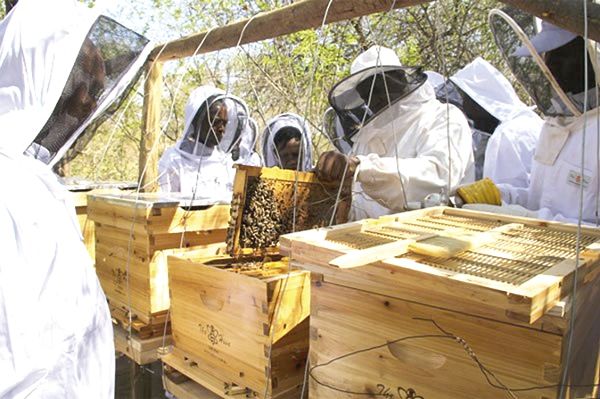
Increasing demand for honey, time to attend to beekeeping industry
In spite of Ghana having one of the best climatic conditions suitable for beekeeping and honey production, the country imports more than 600 tonnes of honey worth millions of cedis every month.
Data from the Federation of Ghana Bee Keepers Association (FGBA) showed that although about 70 per cent of the country's vegetation supported beekeeping, more than 60 per cent of honey consumed or for manufacturing purposes were sourced from foreign markets, including Burkina Faso.
According to the federation, the situation was mainly attributable to the increasing demand for honey on the local market and failure on the part of local producers to match the demand.
It attributed the failure to the lack of adequate resources and inputs at the disposal of local industry players, owing to the absence of credit schemes and policy direction to propel them to produce in commercial quantities.
This, perhaps, summarises the extent to which Ghana's beekeeping and honey industry has been neglected over the years in spite of the sector’s lucrativeness and huge economic potential.
Untapped opportunities
The FGBA has estimated Ghana’s honey potential to be at 500,000 tonnes per annum, worth about $1.5 billion.
Local players have for years failed to fully exploit this huge potential, accounting for only 5000 tonnes per annum due to limited capacity.
With the increasing demand for honey in Europe and Asia, whose bees are endangered due to environmental challenges and industrialisation, the competitive search for organic honey in other areas has increased drastically.
In 2011, the European Union (EU) certified Ghana to join other African countries accredited to export honey to the EU market.
This implied that the international market for honey had expanded and Ghana was expected to meet the supply gap by increasing the volume of trade and quality of production.
Eight years after the certification, not a single tonne of honey from Ghana has entered the juicy EU market, with local producers even struggling to meet the local demand, according to the FGBA.
Following a big demand for honey in Turkey, a Turkish company, Helal Aricilik, arrived in the country in 2014 and had requested a total of 150,000 tonnes of honey per shipment regarding a broker deal with the Ghana Exports Promotion Centre.
Due to capacity challenges, the demand was slashed to 25,000 tonnes per month, a decrement that has since not been met by local producers over same capacity issues, leaving the opportunity to hang for years.
Total neglect
In 2017, the Ghana Bee keepers Association requested for a GH¢1.62 stimulus package from the government to implement its five-year development programme to revamp the ailing industry.
Under the programme, the association intended to inject about 480,000 new beehives which would have translated into 3.6 million kilogrammes of honey over the five-year period.
According to industry players, the request had since not been honoured by authorities, leaving them to rely on their scanty investments to produce on a smaller scale.
In an interview, the Executive Director of the FGBA, Mr Solomon Wakemeh, said the federation had since 2014, trained over 2000 people in beekeeping but none had adopted the profession because “we have not been able to provide them with the necessary inputs”.
“It is surprising that a country that is struggling with teeming youth employment has failed to take advantage of the abundant opportunities in this sector, which can offer employment to hundreds of people,” he stated.
Research required
As the government intends to industrialise and add value to the country’s resources through its One-District, One-Factory initiative, it is important that attention is given to the honey production industry.
There is also the need for intensive research in the area to ascertain the worth of the industry to guide the enactment of a comprehensive policy to revamp the sector.
It is noteworthy that it would be difficult to convince investors to channel resources into the sector if there is no comprehensive value for money analysis available to win their trust.
